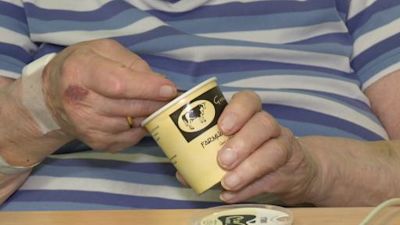Ice cream diet could keep elderly patients cool and healthier during the heatwave

Patients at Nottingham University Hospitals are being offered a new cooling diet as temperatures reach the high thirties.
Elderly people being treated in the trauma and orthopaedic wards are trialling a healthier ice cream during the heatwave, which has added nutritional benefits.
The NHS Trust hopes the protein-rich ice cream will give older patients with muscle, bone, and joint conditions like arthritis enough nutrients when they are being treated.
The trial is part of the Nottingham Ice (N-ICE) Cream study determining whether patients prefer taking nutritional supplements through drinks or a frozen treat over two days.
Professor Opinder Sahota, a consultant in ortho-geriatric medicine at the NHS Trust, is leading the N-ICE Cream research study.
He says the new ice cream could ensure older people who arrive at the hospital malnourished have enough calories to get better.
"You need protein to help your muscles build and especially if you have surgery and the wound needs to heal, again you need the protein."
"It's very difficult to get protein apart from your meals, and you can imagine if you're not eating your meals you need the protein in some other way."
"That protein will then go into the body and help the muscle to build up and hopefully help patients get fitter and stronger and get home sooner."
The vitamin D fortified ice cream is made at Dreamy Cow Farmhouse Ice Cream in Atherstone, Leicestershire.
One tub of N-ICE Cream contains 19 grams of protein, whereas a normal tub from a supermarket contains 0.5 grams.
The protein-rich ice cream means patients will more than double their intake if they have two pots.
Determining if patients like the ice cream is the first stage of the study. The second is to see if the frozen treatment can prevent muscle wasting after patients are admitted.
97-year-old Kathleen, who has been trialling the ice cream at Queens Medical Centre, says it's kept her refreshed and cool during as temperatures soar.
"There's nourishment in it if you can't eat food it accentuates it really. If you can get nourishment through this then it's very refreshing. Even in the winter," she added.
The trial will continue until the end of July and if successful Prof Sahota hopes it will be pushed out nationwide.